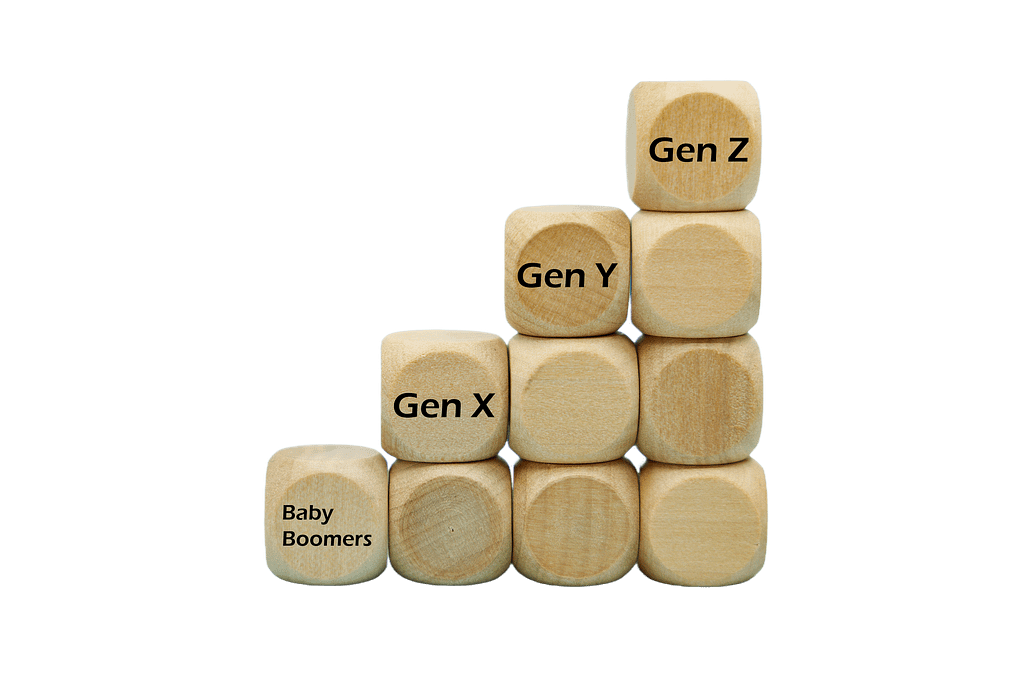Get to Know Your Next Homebuyers!
RedFin data compared the buying activity of the generational age groups in 2023:
Gen Zers (born 1997-2012)
aged 11-26
Millennials (born 1981-1996)
aged 27-42
Gen Xers (born 1965-1980)
aged 43-58
Baby Boomers (born 1946-1964)
aged 59-77

According to U.S. Census Bureau predictions, millennials (also known as Gen Y) became the most numerous generation in 2019. Several years ago, they surpassed the Baby Boomers who numbered slightly more than 71 million people. Millennials also represent a larger cohort than Generation X, known as the “middle-child” generation because of its smaller size in comparison with the baby boomer and millennial generations. About 65 million individuals are considered Gen X.
Comparing Millennials to their Parents’ Generation
Back in 1981, 31 years olds represented the typical age of all homebuyers in the nation. But in 2021, National Association of Realtors (NAR) data showed the typical age of all homebuyers rose to 47 years old. And more current data, including Texas statistics, continues to hold the median age of homebuyers at 47.
Millennials’ delay in becoming homeowners is mainly blamed on sky-high college debt. And now the housing affordability crisis will delay some Millennials even longer. Surely, the older set has an edge over those who missed out on buying before rates shot up. But even despite record high inflation rates, rising interest rates, and worsening housing affordability, young adults have continued the post-pandemic trend of moving out of parental homes.Themedian age of first-time buyers last year was 32 years old. And this indicates that Millennials are finally coming to the table.
Redfin reports that 25- to 44-year-olds bought roughly 60% of homes that sold over the last several years. Homeownership rates for millennials rose last year rose from 52 percent to 54.8 percent.Coming right behind them, Gen Z may change several trajectories. RedFin’s data shows 26.3% of adult Gen Zers (19-26 years old) owned a home in 2023.
ASID “Top Trends for 2024” puts “LEARNING FROM GEN Z” at the top of the list.
The number of Generation Z members is estimated at 69.58 million. Born between 1997 and 2012, they make up about 21% of the U.S. population. ASID advises that it’s time for the housing industry to become familiar with their evolving empathies and concerns.
An early analysis of Gen Z’s homebuying patterns already indicates a divergence from those of older generations. Growing up during a global crisis, they have a heightened focus on wellbeing. Facing crippling inflation, historically high mortgage rates and an overall turbulent economy, they trust nobody but themselves in going with whatever feels right. And for many, what feels right is having stability earlier in their lives.
As first-time homebuyers who are just getting started in their careers, affordability is key. While Millennials are primarily buying in the country’s prevalent job centers, many Gen-Z jobs are remote or hybrid. This makes Gen-Zers more willing to move to locales where the promise of owning a home is more within their reach.
“As the most racially and ethnically diverse generation, those in Gen Z have distinctly different priorities than prior generations,” says ASID. “Diversity and inclusion are important to Gen Z. They’re more likely to seek neighborhoods that have people with a mix of backgrounds.” According to a study by Homes.com, many Gen Zers who didn’t grow up in diverse neighborhoods have since moved to one.

But Millennials and Gen-Zs Need to Earn Six Figures to Afford a Starter Home in Many Places
A recent report by Redfin says potential homebuyers need a salary of $114,627 to afford a median-priced house in the U.S., based on the median home price of $420,000 in August.
“House hacking” may help some homeowners cope with the affordability crisis. The term refers to the practice of renting out a portion of your home or an entire property for an additional stream of income. Younger generations are especially keen on the idea. In Zillow’s survey, more than half of millennial, 55%, and Gen Z home buyers, 51%, expressed positive views on house hacking.
“It’s clear that housing is part of the “production function” to build prosperity. It’s also integral to the ladder of upward mobility. People go from an apartment to, for the first time, owning something. And the equity they build up in their home is, for most people, the largest contribution to their net worth. So it’s more than just four walls and shelter. It’s an investment that introduces people to ownership, net worth and wealth.”
–Henry Cisneros
